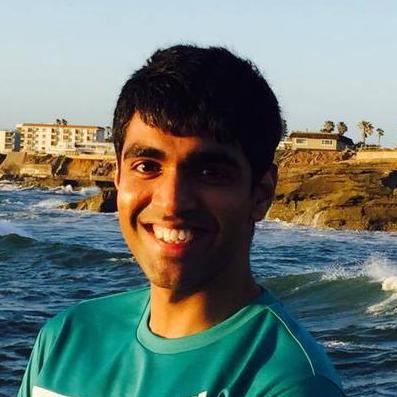
CSE Ph.D. candidate Viraj Deshpande will stage the final defense of his doctoral dissertation on September 20 at 10am in room 1202 of the CSE building. The topic of his thesis: "Computational Methods to Study Genomic Structure and Structural Variation."

Deshpande is co-advised by CSE professors Vineet Bafna and C.K. Cheng, who will co-chair the committee. Other members of the committee will include CSE professor Pavel Pevzner, School of Medicine professor Hannah Carter, and Department of Pathology professor Paul Mischel, from the university's Ludwig Center for Cancer Research. The examination is open to the public.
With his Ph.D. behind him, Deshpande is staying in San Diego, as he begins a career in industry as a Bioinformatics Scientist at San Diego-based Illumina, Inc.
Abstract: Chromosomes, the carriers of genes, were first observed in plant cells in 1842. Visual inspection of chromosomes via cytogenetics laid the foundation for understanding the structure and content of chromosomes. Eventually, Watson and Creek's discovery of DNA, the building block of the chromosomes paved the way for genomics and the DNA sequencing revolution. As we lie on the cusp of scaling genomics to personalized analysis and to the broad diversity of species, the new generation of scientific discoveries relies heavily on computational analysis of complex datasets.
This thesis highlights computational methods that we developed for interpreting various data modalities to elucidate the large scale structure of the genome. We describe two tools, Cerulean and AmpliconArchitect(AA), which aim to interpret sequencing data in different contexts to find an unknown genomic structure. The crux of these tools is the representation of the genomic structure as a graph which encodes connectivity of genomic segments, followed by delineation of the graph into ordered genomic segments. Cerulean performs hybrid de-novo assembly of a novel genome by combining accurate, short sequencing reads with erroneous, long reads which can span longer distances along the genome. AA focusses on a specific feature of cancer genomes called focal amplifications, or regions with a high increase in copy number. These often contain cancer-causing oncogenes and undergo complex rearrangements. AA simultaneously uses short sequencing reads from the cancer genome and information from the human reference genome to predict the structure of the focal amplification.
We applied AA to comprehensively characterize the nature of focal amplifications across human cancer. We combined sequence analysis of AA with extensive computational analysis of cytogenetic images of cancer cells. Surprisingly, we found that focal amplification occurs through the formation of circular ecDNA structures breaking off from the human chromosomes in as many as 40% of all cancer cases. Through theoretical modeling we showed that formation of ecDNA drastically accelerates tumor growth and evolution, facilitating rapid development of resistance to targeted drugs. This defines a new paradigm in our understanding of cancer and cancer treatment.
Bio: Viraj Deshpande joined the CSE graduate program in 2011 after completing his undergraduate work at the Indian Institute of Technology-Bombay. In 2013 he completed the M.S. with a depth area in Machine Learning, and continued in the Ph.D. program with research interests broadly focused on computational genomics, with specific interest in structural variations and complex rearrangements in human and cancer genomes. Early in his research Deshpande developed one of the first hybrid assembly methods, Cerulean, using short genomics reads and long PacBio reads. "The tool has been downloaded over 1,300 times even though it is not in active development," noted Deshpande in his bio. His work on extrachromosomal DNA in cancer has modified our understanding of tumor genome evolution, resulting in widespread coverage in the popular press and a recent commentary on the subject in the journal Science.
At UC San Diego, Deshpande served as president of the Jacobs School's Graduate Student Council, the Association of Indian Graduate Students, and the Argentine Tango Club of UC San Diego. Earlier he received a Gold medal at the International Astronomy Olympiad in Beijing (2005), and took second-place in regional rounds of the ACM-InterCollegiate Programming Contest Amritapuri (2008-2009), and the Regional Mathematics Olympiad (2005-2006).

